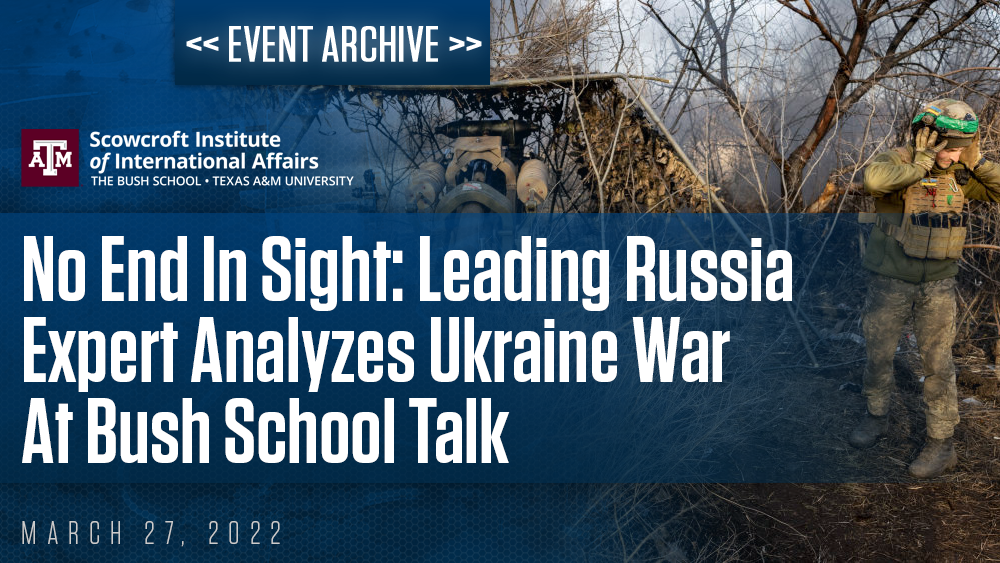
More than a year into Russia’s invasion of Ukraine, fighting in the country continues, as the conflict wears down into a “grinding war of attrition.”
That’s how Dr. Angela Stent, one of the world’s leading experts on Russian foreign policy, described this most recent stage of the conflict at a talk Monday hosted by Texas A&M University’s Scowcroft Institute of International Affairs.
“Really nothing much has changed in the last four months,” said Stent, a professor emeritus at Georgetown University and senior adviser to its Center for Eurasian, Russian and East European Studies. “The Russians have taken a tiny bit more territory, but not very much. There is intense fighting still going on in the city of Bakhmut, which is largely destroyed. It’s been going on since August, but the Ukrainians are holding out.”
Ukrainian forces in that area are mainly confronting private mercenaries from Russia’s Wagner group, Stent said. Russia has been relying on a growing number of these mercenaries to supplement its formal military forces as recruiting slows and casualties mount.
“It’s hard to imagine either side wanting to sit down and negotiate.”
Renowned scholar Angela Stent
“This is a grinding war, and there are so many casualties,” Stent said. “We believe that over 200,000 Russians have either been killed or severely wounded in action. The numbers for Ukraine are probably not much less than that.”
Back on the home front, the conflict has deepened social and political fractures in Russian society as Vladimir Putin’s government continues to crack down on dissidents. Stent said roughly a million Russians have fled the country since the war began, either because they oppose the invasion or wish to avoid being drafted.
“Many of the Russians who fled at the beginning are some of the best and brightest,” Stent said. “They’re young, they’re tech-savvy, so this has amounted to a brain drain from Russia too.
“Ultimately the long-term consequences for Russia are quite serious,” she said. “These people will only come back to Russia if they can live in a society which is freer, and a society that’s more modern.”
Still, Stent said, it’s hard to see Putin’s grip on the country slipping any time soon. She said rumors that the Russian president’s health is failing are unsubstantiated, and he remains committed to annexing large swaths of Ukrainian territory despite mounting setbacks.
“Putin is not terminally ill,” Stent said. “What you can say is that Putin was really isolated during COVID. He only talked to a few people around him who reinforced all of his views and paranoia, so I think maybe his sense of reality is not what it was before.”
Still, she said, “Putin has said right from the beginning 23 years ago that he was determined to restore Russia as a great power. He said that is its rightful role in the world. … Catherine the Great said ‘that which stops growing begins to rot’ — I have to expand my borders in order to keep my people safe. So this idea of defensive expansionism is very deeply ingrained in Russian history and contemporary Russian thought.”
While the Russian economy has continued to suffer under economic sanctions imposed by the U.S. and its Western allies, Stent noted that Putin has found varying degrees of support across the rest of the world.
India is now Russia’s largest oil buyer, and China — though technically maintaining a position of neutrality in the conflict — has pursued a cozy relationship with Russia as part of a bid to undermine U.S. global hegemony, Stent said.

Roman Pilipey/Getty Images
“Putin has always said that he believes in the need for post-West order. In other words, a global order where the United States and its allies’ Western values do not dominate,” Stent said. “China certainly sees itself now as the leader, with Russia, of an anti-Western partnership. And China definitely does not want Russia to lose this war.”
Much of Africa, the Middle East and Latin America have also declined to condemn or sanction Russia since the invasion began, Stent said.
“Many of these countries view what is happening between Russia and Ukraine as a local European conflict,” she said. “They also look at the United States and they accuse the U.S. of hypocrisy. They talk about Iraq, they talk about Vietnam, they talk about the U.S. involvement in Afghanistan, and they say what Russia is doing in Ukraine is no different from what the U.S. has done.”
Whether this war will last as long as any of those conflicts is unclear, though Stent said she expects the fighting to continue for at least the rest of the year. Both sides are reluctant to come to the negotiating table at this stage, with Russia determined to hold more territory and Ukrainian forces dead set on repelling them from the country entirely.
“Despite all the horrors of this war, the majority of Ukrainians want to continue fighting. The vast majority of them say that they will continue fighting until they win because for them, this is really a war of independence. This is a war for their existence,” Stent said. “At the moment, I think the prospects for negotiations are dim. This is a war that could go on for a very long time.”
A full recording of Stent’s talk is now available on the Bush School’s YouTube channel.
By Luke Henkhaus, Texas A&M University Division of Marketing & Communications
Note: This article originally appeared in Texas A&M Today on March 29, 2023

